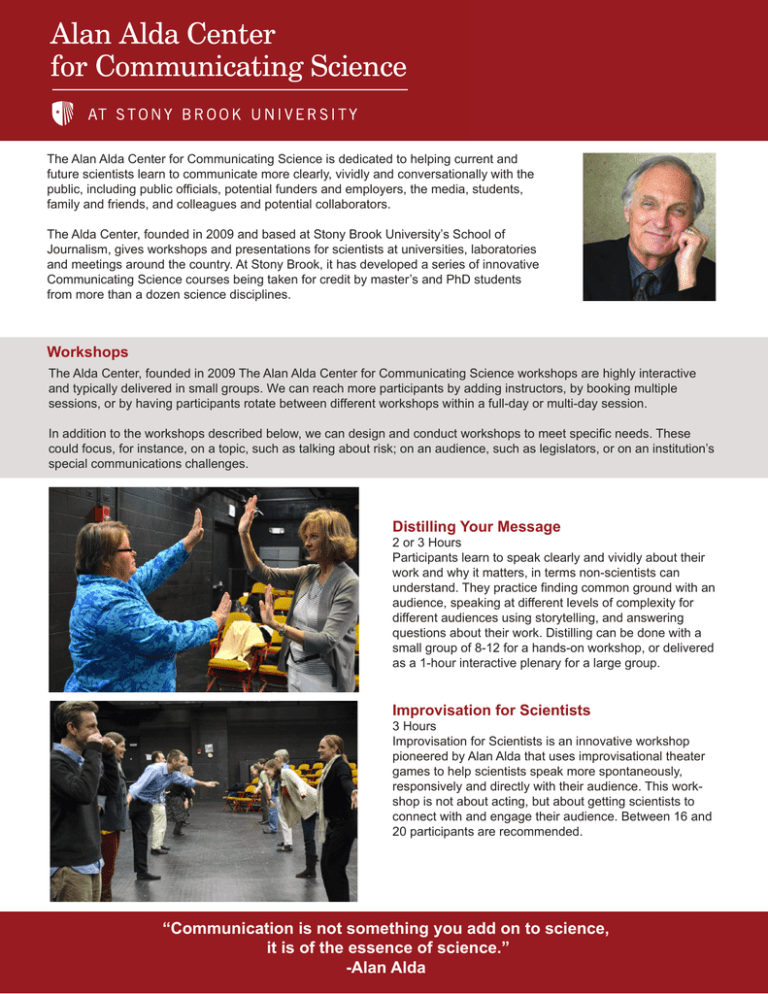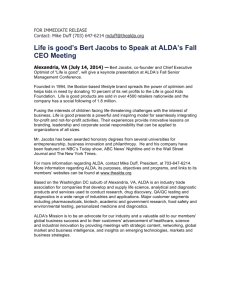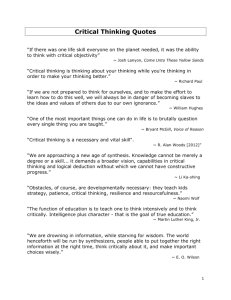workshop flyer - Alan Alda Center for Communicating Science
advertisement

The Alan Alda Center for Communicating Science is dedicated to helping current and future scientists learn to communicate more clearly, vividly and conversationally with the public, including public officials, potential funders and employers, the media, students, family and friends, and colleagues and potential collaborators. The Alda Center, founded in 2009 and based at Stony Brook University’s School of Journalism, gives workshops and presentations for scientists at universities, laboratories and meetings around the country. At Stony Brook, it has developed a series of innovative Communicating Science courses being taken for credit by master’s and PhD students from more than a dozen science disciplines. Workshops The Alda Center, founded in 2009 The Alan Alda Center for Communicating Science workshops are highly interactive and typically delivered in small groups. We can reach more participants by adding instructors, by booking multiple sessions, or by having participants rotate between different workshops within a full-­day or multi-­day session. In addition to the workshops described below, we can design and conduct workshops to meet specific needs. These could focus, for instance, on a topic, such as talking about risk;; on an audience, such as legislators, or on an institution’s special communications challenges. Distilling Your Message 2 or 3 Hours Participants learn to speak clearly and vividly about their work and why it matters, in terms non-­scientists can understand. They practice finding common ground with an audience, speaking at different levels of complexity for different audiences using storytelling, and answering questions about their work. Distilling can be done with a small group of 8-­12 for a hands-­on workshop, or delivered as a 1-­hour interactive plenary for a large group. Improvisation for Scientists 3 Hours Improvisation for Scientists is an innovative workshop pioneered by Alan Alda that uses improvisational theater games to help scientists speak more spontaneously, responsively and directly with their audience. This work-­ shop is not about acting, but about getting scientists to connect with and engage their audience. Between 16 and 20 participants are recommended. “Communication is not something you add on to science, it is of the essence of science.” -­Alan Alda Using Digital Media 90 Minutes to 3 Hours How to use blogs, podcasts, Twitter and other forms of social media for two-­way communication about science and health with different segments of the public, including colleagues in other disciplines. The workshop can include hands-­on instruction in working with digital media, tailored to participants’ interests and levels of experience. For up to 12 participants. Connecting with the Community 2-­3 Hours Participants will learn how to use communication techniques, cultural competency, and health literacy concepts to reach and mobilize the community and key stakeholders on health-­ and science-­related issues related to their research, outreach or community education objectives. The workshop will incorporate role-­playing and community networking skills to help participants make connections with key people and groups relevant to their current interests and work. Connecting with the Community can be done as an interactive plenary, or in a small-­group session for up to 20 people. Writing about Science for the Public 3-­6 Hours Participants can expect to come away from this workshop with a heightened awareness of who they are writing for and with an increased confidence in their ability to adapt their writing to a variety of audiences. The workshop will address issues of voice, audience adaptation, clarity of organization, sentence-­to-­sentence coherence, punctuation, parallel struc-­ ture, and revision strategies, and other writing issues as they come up. The longer version of this workshop can be delivered in two 3-­hour sessions on succeeding days. For 12-­16 partici-­ pants. Media Interview Skills 2-­4 Hours Participants learn how to prepare for a media interview, including shaping clear, crisp answers, fielding difficult questions, and reinforcing their fundamental message. They will be interviewed on video by a professional journalist, with the interviews reviewed and critiqued during the session. After the workshop, participants will be able to download their interviews for their personal or professional use. For more information check out: centerforcommunicatingscience.org or email aldacenter@stonybrook.edu


